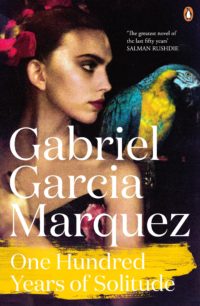CHARACTERS: 4/5
WRITING STYLE: 4.5/5
CLIMAX: 3.5/5
ENTERTAINMENT QUOTIENT: 3.5/5
Salman Rushdie calling it ‘The greatest novel in any language of the last fifty years’ and The New York Times wishing to make it ‘required reading for the entire human race’ were reasons enough for me to pick up One Hundred Years of Solitude.
Whether it lived up to these absurdly high expectations will make for a difficult answer.
This is a tale of the village of Macondo, right from its inception till it ends up as a “fearful whirlwind of dust and rubble”. This story follows one hundred years in the life of Jose Arcadio Buendia and that of his descendants.
While the narrative proceeds in a linear sense of time, there is something to be said about the way in which the Buendia family seems to follow one large circle, with the newest members of the family imitating their forefathers unconsciously, in an eerily familiar way.
The very act of naming them at birth seals their fate and foretells how they’ll live out the rest of their lives.
There are the Jose Aracadios, exuding raw energy and machismo, taking on ridiculously ambitious projects, and coming out on top before succumbing to tragic ends.
And the many Aurelianos, with their remarkably clairvoyant eyes and that heavy air of solitude hanging around them. Together they form the very image of a Latin American man, passionate and aloof at the same time.
However, instead of taking charge of the family and leading the household, they are engrossed in their fanciful and irrational thoughts. This is where the women come into the picture.
Characterized by common sense and a determination not to let the house fall apart, they are the ones responsible for the thriving family line.
Ursula, for one, is as good as the backbone of the family, living for over a hundred years, and keeping the family traditions intact, even when Macondo has transformed into a town completely different from the one she helped build.
Marquez maintains a gentle pace throughout the narrative, enabling us to get acquainted with the various family members, to get used to their quirks and personalities and to linger just long enough before moving on with the story.
Thus, there is no one protagonist to root for, but a multitude of characters.
The novel is rife with magical realism, so much so that it is often referenced as the seminal work of the genre.
There is a constant interplay between the ordinary and the extraordinary, and it is portrayed with such perfection that the reader stops questioning the unnaturally long lives, the town plagued with insomnia, or the girl ascending to heaven amidst laundry.
However, the reader should be forewarned that One Hundred Years of Solitude makes for a difficult reading experience.
The lack of a protagonist or a conventional narrative style can be discouraging. The repetition of names can be irritating at times, making it difficult to identify the characters correctly.
The Penguin edition has very considerately provided a family tree at the beginning of the book.
While I had to put down the book after a few chapters, exasperated by the way things were shaping up, Marquez had by then instilled in me a sense of curiosity as to the fate of Macondo.
I managed to complete the book, albeit with intermittent breaks, and have come out the better for it.
I’m not sure if I’ll go back to the book anytime soon or classify it as a favourite, but that doesn’t imply that I can’t recognize the genius behind it.
One Hundred Years of Solitude is indeed a book of epic proportions, a wondrous tale, but to call it the ‘greatest novel’ as Rushdie did, well, to each his own.
